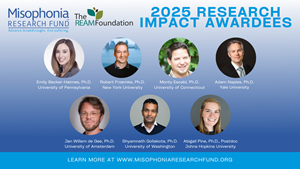Fueling Discovery: Misophonia Research Fund Launches New Team Science Award, Expands 2026 Funding Opportunities, and Announces Latest Grantee Cohort
CHICAGO, Nov. 04, 2025 (GLOBE NEWSWIRE) -- The Misophonia Research Fund (MRF), an initiative of the REAM Foundation, announces a major expansion of its support of misophonia research – launching the first-ever team science Misophonia Research Consortium Award, opening its 2026 Request for Proposals (RFP), and introducing a new cohort of MRF-funded investigators. Together, these milestones mark a pivotal moment in advancing understanding, diagnosis, and treatment for misophonia, a disorder in which everyday sounds can trigger intense emotional and physiological reactions.
At the heart of these announcements is a shared belief: progress must be accelerated towards meaningful impact for individuals and families whose lives are impacted by misophonia.
“Behind every grant we fund is a real person or family searching for understanding and ways to combat misophonia,” said Dr. Lauren Harte-Hargrove, Executive Director of the MRF. “This next phase of our work is about collaboration, innovation, and urgency. The Misophonia Research Consortium Award will bring research teams together in ways that dramatically speed the path from insight to impact.”
A Breakthrough in Collaboration: The Misophonia Research Consortium Award
The Misophonia Research Consortium Award, the MRF’s first team science mechanism, will fund multi-site, cross-disciplinary research that unites investigators around shared goals – from foundational mechanisms to intervention development. The award emphasizes shared data infrastructure, harmonized methods, and coordinated scientific strategies across research centers, providing up to $1.5 million per project.
“The Misophonia Research Consortium Award represents a pivotal moment,” said audiologist Dr. Julia Campbell, Clinical Associate Professor at the University of Texas at Austin, and member of the MRF Scientific Advisory Board. “By uniting experts across disciplines and institutions, we can address the core mechanisms of misophonia and translate those discoveries into real clinical impact.”
2026 RFP Now Open
With the release of its 2026 RFP, the MRF invites proposals from clinical and preclinical researchers across neuroscience, psychology, audiology, neurobiology, computational and data science, and related disciplines. Three award mechanisms are available:
- Data Discovery Award – up to $75,000 for acquisition of key datasets
- Research Impact Award – up to $500,000 for full-scale studies
-
Misophonia Research Consortium Award – up to $1,500,000 for team science collaborations
Priority areas include:
- Mechanisms of misophonia
- Diagnostic tools and outcome measures
- Treatment and intervention development
- Cross-site data and collaboration infrastructure
Deadlines for submission can be found at https://www.misophoniaresearchfund.org/.
Introducing the New MRF Grantee Cohort
The MRF also announces its newest group of Funded Investigators, selected through rigorous peer review. These projects represent diverse and complementary approaches — from brain circuits and clinical interventions to measurement tools and translational science.
2025–2026 MRF Grantees:
Research Impact Award
- Johns Hopkins University, where Abigail Pine, PhD will strengthen treatment outcomes by developing a parent-focused approach to support youth with misophonia.
- University of Amsterdam, where Jan Willem de Gee, PhD will develop accessible, objective tools to measure and understand the physiological stress response in misophonia.
- University of Connecticut, where Monty Escabí, PhD will use machine learning to pinpoint sound features that make misophonic triggers distressing and create tools to reduce their impact.
- University of Pennsylvania, where Emily Becker-Haimes, PhD will develop a practical guide to help clinicians apply the latest misophonia research in everyday care.
- University of Washington, where Shyam Gollakota, PhD will leverage AI to enhance noise-canceling headphones that selectively remove triggering sounds.
- Yale University, where Adam Naples, PhD will investigate how attention and arousal interact during trigger sounds to inform better diagnostic and treatment approaches.
-
New York University, Grossman School of Medicine, where Robert Froemke, PhD will build an animal model based on human research to better understand the brain processes involved in misophonia and explore new treatment options.
Momentum in a Growing Field
Since 2019, the MRF has committed over $17 million to support 53 studies across 36 institutions, creating the world’s largest philanthropic portfolio dedicated solely to misophonia research. With each new funding cycle, the MRF continues to accelerate the path toward evidence-based care and improved quality of life for those living with misophonia.
About the Misophonia Research Fund
The Misophonia Research Fund (MRF) supports scientific research that advances understanding, diagnosis, and treatment of misophonia. Through grantmaking, convening, and cross-disciplinary collaboration, the MRF works to accelerate discoveries that improve outcomes for individuals and families living with misophonia.
Media Contact:
Solena Mednicoff
Research and Communications Manager
Solena@misophoniafund.org
A photo accompanying this announcement is available at https://www.globenewswire.com/NewsRoom/AttachmentNg/5fb5d6b3-6aea-4572-848e-ca35bf98cc2c

Legal Disclaimer:
EIN Presswire provides this news content "as is" without warranty of any kind. We do not accept any responsibility or liability for the accuracy, content, images, videos, licenses, completeness, legality, or reliability of the information contained in this article. If you have any complaints or copyright issues related to this article, kindly contact the author above.


